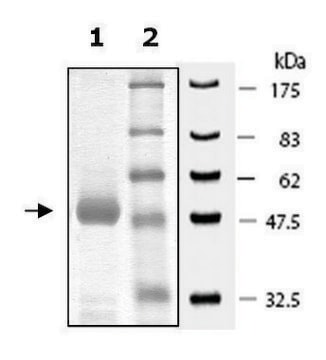ZRB1715
Anti-p-KAP-1 (Ser824) Antibody, clone 1K9 ZooMAb® Rabbit Monoclonal

recombinant, expressed in HEK 293 cells
Synonyme(s) :
E3 SUMO-protein ligase TRIM28, EC:2.3.2.27, KRAB-associated protein 1, KRAB-interacting protein 1, KRIP-1, RING finger protein 96, TIF1-beta, Transcription intermediary factor 1-beta, Transcriptional intermediary factor 1-beta, Tripartite motif-containing 28
About This Item
Produits recommandés
Source biologique
rabbit
Niveau de qualité
Produit recombinant
expressed in HEK 293 cells
Conjugué
unconjugated
Forme d'anticorps
purified antibody
Type de produit anticorps
primary antibodies
Clone
1K9, recombinant monoclonal
Description
recombinant, expressed in HEK 293 cells
Gamme de produits
ZooMAb® learn more
Forme
lyophilized
Produit purifié par
using Protein A
Espèces réactives
human
Conditionnement
antibody small pack of 25 μL
Caractéristiques du produit alternatif plus écologique
Waste Prevention
Designing Safer Chemicals
Design for Energy Efficiency
Learn more about the Principles of Green Chemistry.
Validation améliorée
recombinant expression
Learn more about Antibody Enhanced Validation
sustainability
Greener Alternative Product
Technique(s)
affinity binding assay: suitable
immunocytochemistry: suitable
inhibition assay: suitable
western blot: suitable
Isotype
IgG
Séquence de l'épitope
C-terminal
Numéro d'accès Protein ID
Numéro d'accès UniProt
Autre catégorie plus écologique
Conditions d'expédition
ambient
Température de stockage
2-8°C
Catégories apparentées
Description générale
Spécificité
Immunogène
Application
Evaluated by Western Blotting in lysate from HeLa cells treated with Etoposide.
Western Blotting Analysis: A 1:1,000 dilution of this antibody detected Phospho-KAP-1 (Ser824) in lysate from HeLa cells treated with Etoposide (20 g/mL; 3 h).
Quality Control Testing
Evaluated by Western Blotting in lysate from HeLa cells treated with Etoposide.
Western Blotting Analysis: A 1:1,000 dilution of this antibody detected Phospho-KAP-1 (Ser824) in lysate from HeLa cells treated with Etoposide (20 g/mL; 3 h).
Tested Applications
Immunocytochemistry Analysis: A 1:100 dilution from a representative lot detected Phospho-KAP-1 (Ser824) in HeLa cells treated with and without etoposide.
Peptide Inhibition Assay: Target band detection in lysate from HeLa cells treated with Etoposide was prevented by preblocking of a representative lot with the immunogen phosphopeptide, but not the corresponding non-phosphopeptide.
Affinity Binding Assay: A representative lot of this antibody bound p-KAP-1(Ser824) peptide with a KD of 8.5 x 10-8 in an affinity binding assay.
Note: Actual optimal working dilutions must be determined by end user as specimens, and experimental conditions may vary with the end user.
Description de la cible
Forme physique
Reconstitution
Stockage et stabilité
Autres remarques
Informations légales
Clause de non-responsabilité
Not finding the right product?
Try our Outil de sélection de produits.
Code de la classe de stockage
11 - Combustible Solids
Classe de danger pour l'eau (WGK)
WGK 1
Point d'éclair (°F)
Not applicable
Point d'éclair (°C)
Not applicable
Certificats d'analyse (COA)
Recherchez un Certificats d'analyse (COA) en saisissant le numéro de lot du produit. Les numéros de lot figurent sur l'étiquette du produit après les mots "Lot" ou "Batch".
Déjà en possession de ce produit ?
Retrouvez la documentation relative aux produits que vous avez récemment achetés dans la Bibliothèque de documents.
Notre équipe de scientifiques dispose d'une expérience dans tous les secteurs de la recherche, notamment en sciences de la vie, science des matériaux, synthèse chimique, chromatographie, analyse et dans de nombreux autres domaines..
Contacter notre Service technique








